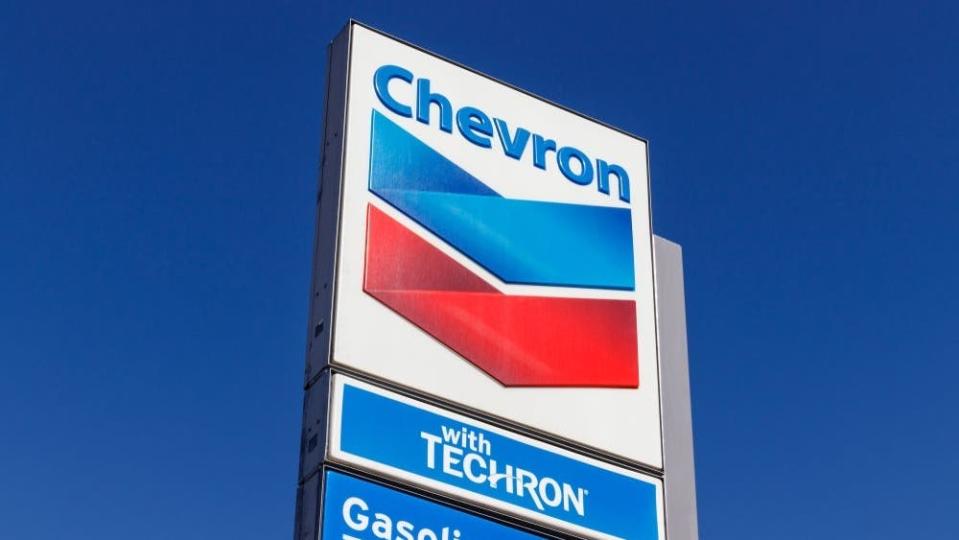Chevron To $205? This Analyst Thinks So, Implying 27% Upside

Benzinga and Yahoo Finance LLC may earn commission or revenue on some items through the links below.
Chevron Corporation (NYSE:CVX), a global leader in the energy sector, has recently garnered attention from analysts due to its strong performance and future growth prospects. Mizuho has maintained a Buy rating on Chevron stock and raised the price target from $200 to $205, suggesting a substantial 27.41% upside from the current price of $160.90. This bullish sentiment is echoed by other prominent analysts, with Truist Securities and HSBC setting price targets of $170 and $174, respectively, resulting in an average price target of $183 among the three firms, implying a potential 12% upside for the stock.
Bull Case
Chevron’s bull case is supported by several key factors that demonstrate the company’s strong position in the energy sector and its potential for continued growth.
Strong Financial Performance: Chevron’s recent first-quarter 2024 earnings release highlights the company’s robust operational and financial performance. Despite a slight decrease in earnings compared to the previous year, Chevron reported a 12% increase in worldwide production and returned $6 billion in cash to shareholders, demonstrating its commitment to delivering value to investors.
Strategic Acquisitions and Project Milestones: The company’s success can be attributed to higher upstream sales volumes in the U.S., particularly due to the acquisition of PDC Energy, Inc., and sustained strong execution in the Permian and Denver-Julesburg Basins. Additionally, Chevron achieved key project milestones in Kazakhstan, the East Mediterranean, and the U.S., further enhancing its global presence and production capabilities.
Consistent Dividend Growth: Chevron boasts an impressive dividend track record, having increased its dividend for 36 consecutive years, with a five-year compound annual growth rate (CAGR) of 6.25%. The current forward dividend yield stands at 3.99%, making it an attractive option for income-seeking investors.
Investment in Lower Carbon Technologies: Chevron has made significant strides in its lower carbon strategy, aiming to reduce the carbon intensity of its operations and grow its renewable fuels, carbon capture, hydrogen, and other emerging technologies businesses. This positions the company well for the ongoing energy transition and demonstrates its commitment to a more sustainable future.
Bear Case
While Chevron’s bull case is compelling, it is essential for investors to consider the potential risks and challenges that the company may face in the future.
Volatility in Oil Prices: Chevron’s financial performance is heavily influenced by fluctuations in global oil prices. Any significant or prolonged downturn in oil prices could negatively impact the company’s revenue, profits, and stock price.
Increasing Competition in Renewable Energy: As the world shifts towards cleaner energy sources, Chevron faces increasing competition from both established and emerging players in the renewable energy space. The company’s ability to successfully navigate this transition and maintain its market share will be crucial to its long-term success.
Regulatory and Environmental Risks: The energy industry is subject to stringent regulations and increasing environmental scrutiny. Any changes in regulations or environmental policies could result in higher compliance costs and potential legal liabilities for Chevron, which may impact its financial performance and stock price.
Geopolitical Risks: Chevron’s global operations expose the company to various geopolitical risks, such as political instability, nationalization of assets, and trade restrictions. These risks could disrupt the company’s operations, supply chains, and financial performance, potentially affecting its stock price.
While Chevron's strong financial performance and consistent dividend growth is compelling, it's important to consider the risks that could significantly impact future growth and dividend payouts. As with any investment, it's crucial to conduct your own research and consider your personal financial goals.
Should You Buy Chevron Today?
While Chevron’s strong performance and attractive dividend yield make it a compelling stock to consider, sophisticated investors understand the importance of diversification across various asset classes. Private market investments, such as real estate and private credit, can offer unique benefits and potentially higher returns compared to traditional public market investments.
By allocating a portion of your portfolio to private market investments, you can potentially enhance your overall risk-adjusted returns and reduce volatility. These alternative investments often have low correlations with public markets, providing a hedge against market fluctuations. Additionally, private market investments may offer access to unique opportunities not available in public markets.
Check out some of Benzinga's top picks for private market opportunities available now:
Integris Secured Credit Fund IV
The fund provides a fixed annual return of 12%, payable quarterly, over a 2-year period starting April 2024 and ending April 2026. The note is secured by collateral with an estimated value of $71M, with an anticipated loan-to-value ratio of 14%.
Minimum investment: $100,000
Available to: Accredited investors
Invest in the future growth of Austin's real estate market through an innovative home equity investment product. Austin Cityfund's assets have already appreciated 10.90% since July, delivering strong returns for investors.
Minimum investment: $500
Available to: Accredited and non-accredited investors
View more private market offerings on Benzinga's Alternative Investment screener.
This article Chevron To $205? This Analyst Thinks So, Implying 27% Upside originally appeared on Benzinga.com
